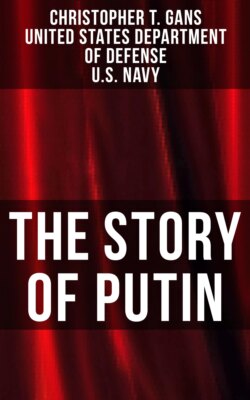Читать книгу The Story of Putin - United States Department of Defense - Страница 7
На сайте Литреса книга снята с продажи.
D. BACKGROUND
ОглавлениеTable of Contents
Anti-Americanism in Russia, whether emanating from the Kremlin or other segments of the populace, has influenced Russian-American relations during the ongoing era of Vladimir Putin. Anti-Americanism, however, was not new to Russia with Putin’s ascension to power on December 31, 1999. It has existed around the globe and among the world populace as well as within Russian politicians, elites, and the public for some time. Global anti-Americanism in the 1990s, according to Fouad Ajami, was much more rampant than many casually observed, and that post 9/11 sympathies for the United States were barely skin-deep and completely temporary. Historical hatred of America, thereby, cannot be supplanted but only temporarily hidden.1 A lingering product of Soviet times, Russian anti-Americanism in the 1990s under then President Yeltsin, therefore, simply laid dormant, waiting to resurface, which it did during the Balkan crises of the later 1990s, followed by resurgent global anti-Americanism after the 2003 Iraq invasion.2
Much of the recent global anti-Americanism has been attributed to recent U.S. actions and policy, like those within the Global War on Terror, Iraq, and economic globalization. Russian anti-Americanism can also be attributed to the Soviet past and the history of the anti-Imperialist/Western class struggle. Such an “old” form of anti-Americanism still underlies the “new” form anchored in hatred of current U.S. policies, global influence, and lifestyle.3
According to the Levada Center, one of the pre-eminent organizations that has been gauging Russian public opinion since the late 1980s, vast majorities of people polled from 2003 through 2011 consider the United States to be an aggressor state seeking influence or outright control of other countries. During that same timeframe, large pluralities or even small majorities consistently rate relations between the United States and Russia positively with less than a majority, and often as low as 25%, believing the United States is inherently unfriendly or hostile toward the Russian Federation.4 Within such polling data, however, when observed over the course of several years, marked fluctuations underlying the overall summarizing numbers can be seen. Russian public opinion toward the United States, therefore, often oscillates as much as relations between the two states varies from “allies” to “friends” to “partners” to “colleagues” to “enemies” and back again.
1 Fouad Ajami, “The Falseness of Anti-Americanism,” Foreign Policy, no. 138 (September — October 2003): 58, http://www.jstor.org/stable/3183656.
2 Ole R. Holsti, To See Ourselves as Others See Us: How Publics Abroad View the United States after 9/11 (Ann Arbor: University of Michigan Press, 2008), 46.
3 Eric Shiraev and Vladislav Zubok, Anti-Americanism in Russia from Stalin to Putin (New York: Palgrave, 2000), 2.
4 “Russian Public Opinion 2010 — 2011” (Moscow: Levada Analytical Center, 2012), 276, 292, 293.
